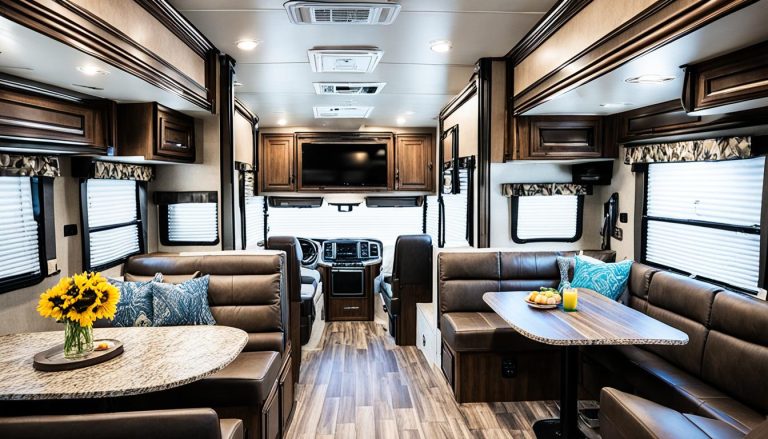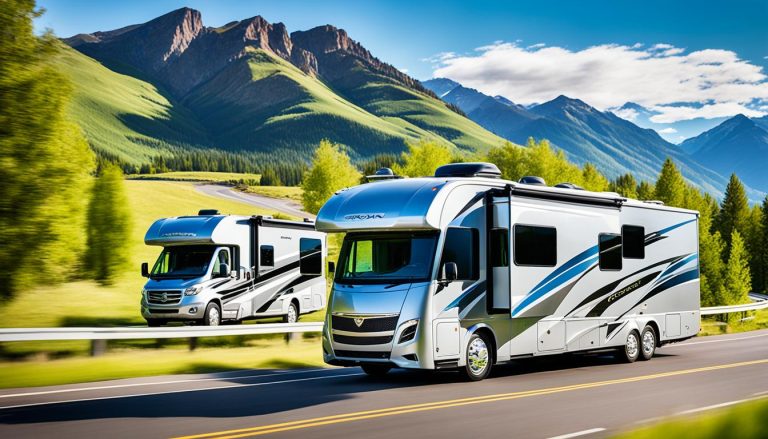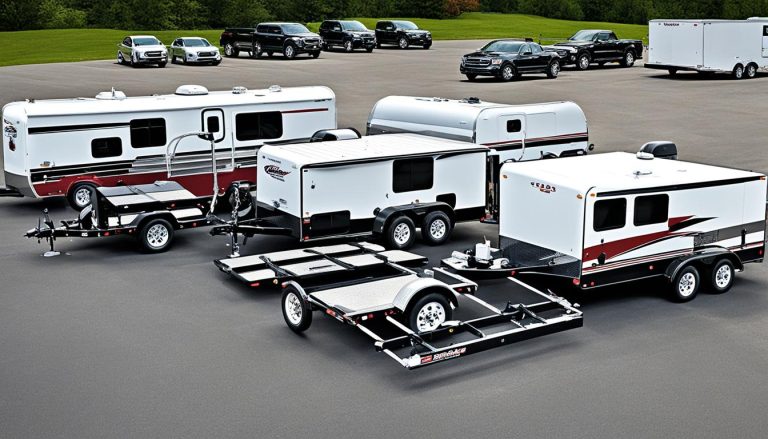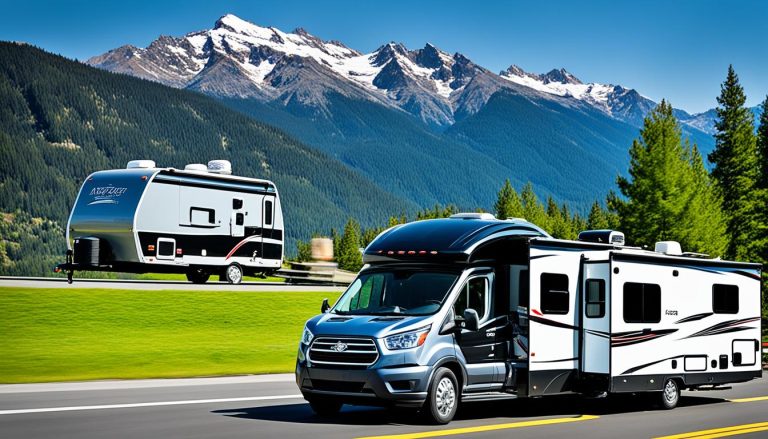Best Travel Trailer Hitches for Secure Trips
gorvlifestyle.com and its partners may earn a commission if you purchase a product through one of our links
Embarking on a road trip with a travel trailer brings the promise of adventure and the comfort of home. But before hitting the open road, it’s pivotal to ensure your journey is safe and secure. This begins with equipping your vehicle with the best travel trailer hitches available. The right hitch not only provides peace of mind but is a critical component in the towable RV experience. With choices ranging from top-rated trailer hitches to durable and safety-oriented designs, travelers can trust in their rigs’ stability during every mile of their voyage. For those who value secure towing and travel trailer hitch safety, selecting a quality hitch is a cornerstone of any successful road trip.
Finding the perfect match for your trailer involves understanding the nuances between various hitch classes and the importance of compatibility with your towing vehicle. Whether you’re a weekend wanderer or a full-time voyager, the best travel trailer hitches ensure that every journey is as reliable as it is memorable.
Key Takeaways
- The right hitch is essential for a safe and enjoyable travel trailer experience.
- Top-rated trailer hitches offer reliability and peace of mind for travelers.
- Durable trailer hitches are a worthy investment for consistent secure towing.
- Choosing a hitch that matches your tow vehicle’s specifications is key to travel trailer hitch safety.
- Whether you’re new to RVing or a seasoned pro, quality hitches are an indispensable part of your gear.
- Research and careful selection of trailer hitches can prevent common towing issues and ensure stability on the road.
Understanding the Importance of Travel Trailer Hitches
When it comes to recreational vehicle (RV) adventures, the stability and safety of your journey hinge significantly upon one piece of equipment: the travel trailer hitch. This pivotal component, often overlooked, plays a critical role in ensuring a smooth and secure connection between your tow vehicle and your home on the road.
The Role of a Hitch in Travel Trailer Stability
Travel trailer hitches are integral to maintaining stability in towing. They serve as the crucial link that binds your vehicle to the trailer, ensuring the load is evenly distributed across both structures. A reliable and durable trailer hitch can mitigate many of the common risks associated with towing, such as swaying and loss of control, which can be exacerbated by uneven roads or harsh weather conditions. With the right hitch, you can drive with the confidence that your trailer will follow smoothly behind your vehicle.
Historical Evolution of Travel Trailers and Their Hitches
The historical evolution of travel trailers and their accompanying hitches is a testament to human ingenuity and the drive toward safer travels. From the nascent days of simple coupling devices to the sophisticated systems available today, trailer hitches have transformed in response to the demands of heavier trailers and longer journeys. Innovations such as hitch balls, weight distribution systems, and sway control mechanisms have advanced in design, offering RVers the peace of mind they deserve. The dedication to trailer hitch safety is evident in every incremental improvement, reflecting over a century’s worth of progress.
As we delve deeper into the specifics of travel trailer hitches, their various types, and installation tips, it’s essential to acknowledge the careful engineering that ensures every journey with your trailer is not only enjoyable but also secure from departure to destination.
How to Choose the Right Travel Trailer Hitch for Your Vehicle
Embarking on the journey of purchasing a travel trailer hitch can seem daunting at first, but it’s all about matching your vehicle’s capabilities with the right equipment. Before making the leap to buy travel trailer hitches, it’s crucial to understand the nuances of your tow vehicle and the types of hitches that would best suit your needs. Here’s a guide to help you through this process.
Analyzing Tow Vehicle Capabilities and Tow Capacity
Before you even look at hitches, it’s important to assess the vehicle tow capacity of your driving companion. The tow capacity dictates how much weight your vehicle can safely pull, and it’s a figure you can’t afford to overlook. These values can be found in the vehicle’s owner’s manual or by consulting the manufacturer. The key is to remember that the total weight of your loaded travel trailer should never exceed the vehicle’s tow capacity.
Height is another crucial factor. Knowing the average travel trailer hitch height for your specific trailer and comparing it to the receiver height of your vehicle will ensure your setup allows for level towing, which is vital for safety and stability. Incorrect hitch height can lead to trailer sway or uneven tire wear.
Assessing Different Hitch Classes and Their Compatibility
Hitches come in various classes, designed to match the weight they can tow and the type of vehicles they fit. Here’s a brief overview to help you assess which class may be appropriate for your tow vehicle and travel trailer:
| Hitch Class | Compatibility | Weight Towing Capacity |
|---|---|---|
| Class 1 | Light-duty passenger cars | Up to 2,000 lbs |
| Class 2 | Small SUVs and sedans | Up to 3,500 lbs |
| Class 3 | Crossovers and minivans | Up to 8,000 lbs |
| Class 4 | Full-size trucks and SUVs | Up to 10,000 lbs |
| Class 5 | Heavy-duty trucks | 10,000+ lbs |
Choosing the correct class of hitch not only affects the safety of your towing system but also the longevity of your vehicle. It’s advisable to opt for a hitch that offers some capacity above what you currently need to accommodate any future upgrades to your traveling setup.
When you’re ready for trailer hitch installation, ensure a professional assesses the hitch class, vehicle specifications, and trailer requirements to guarantee a perfect match. Proper installation will promote a seamless towing experience, letting you focus on the adventure ahead.
Travel Trailer Hitches and Towing Safety Essentials
Ensuring the safety and longevity of your travel trailer relies heavily on proper hitch use and maintenance. Being prepared before a trip and conducting regular adjustments can spare travelers from unexpected troubles and potentially dangerous situations on the road. This section delves into the relevant pre-trip checklist as well as critical maintenance and adjustment schedules.
Pre-Trip Travel Trailer Hitch Checklist
Before setting out on any journey, it’s vital to run through a comprehensive travel trailer hitch checklist. This process verifies the integrity of all connections and hardware, providing peace of mind that your trailer is securely attached and ready for travel.
- Inspect the hitch for signs of wear or damage.
- Check that the hitch pin is secured and the hitch coupler is properly engaged.
- Verify the ball mount is the correct size for the coupler and that it’s properly seated in the receiver.
- Ensure all bolts are tightened to the manufacturer’s specifications.
- Connect the safety chains correctly—crossed beneath the hitch, with enough slack to permit turning.
- Test all lights and signals for proper functionality.
Importance of Regular Hitch Maintenance and Adjustment
Regular travel trailer hitch maintenance and adjustment are as crucial as the initial installation. Making sure that every component of the hitch assembly is functioning optimally not only extends its life but also significantly boosts trailer hitch safety.
| Maintenance Task | Frequency | Importance |
|---|---|---|
| Visual Inspection for Cracks or Rust | Each Use | Prevents failure due to structural damage |
| Lubrication of Moving Parts | Seasonally | Ensures smooth operation and prevents wear |
| Tightness Check of All Fasteners | Bi-annually | Secures connections, preventing detachment |
| Load Rating Verification | Annually | Confirms the hitch can handle the intended load |
| Alignment and Adjustment Check | As Needed | Ensures proper trailer handling and efficiency |
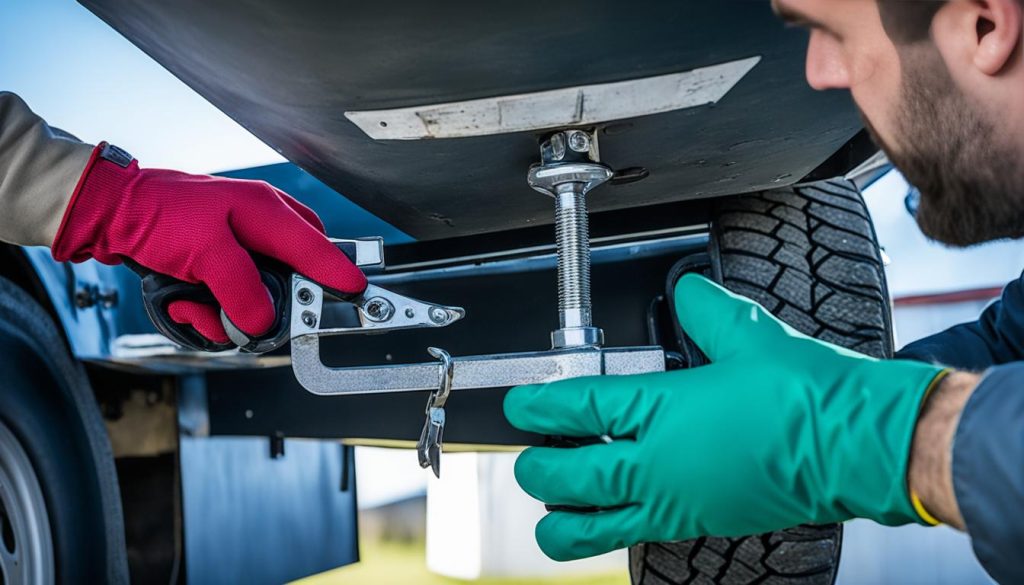
By diligently following these guidelines for travel trailer hitch adjustment and maintenance, travelers can significantly reduce the risk of hitch-related failures on the road. Together with a thorough pre-trip checklist, these practices form the foundation of a robust towing safety protocol every travel trailer owner should adopt.
Top-Rated Travel Trailer Hitches for a Worry-Free Journey
Embarking on an adventure with a travel trailer requires a hitch you can trust. To guarantee travel trailer hitch safety, many opt for the industry’s best travel trailer hitches, known for their robust construction and advanced features. Brands like Blue Ox, ProPride, and Hensley offer top-rated trailer hitches that have consistently received high marks from seasoned travelers for their superiority in handling, durability, and ease of use.

These hitches are not just products; they are investments in your safety and enjoyment on the road. For example, the Blue Ox SwayPro is celebrated for its built-in sway control, allowing for smooth navigation through challenging driving conditions. Similarly, the ProPride Hitch’s innovative design nearly eliminates the dreaded trailer sway that can be so dangerous on busy highways. The Hensley Hitch is another solid option, offering a zero-sway experience that’s highly coveted among travel enthusiasts.
- Blue Ox SwayPro: Offers weight distribution and sway control, promoting a stable towing experience.
- ProPride Hitch: Features a patented design that practically eliminates trailer sway.
- Hensley Hitch: Renowned for its ‘zero sway’ capability, providing peace of mind while on the move.
For those seeking a synthesis of quality and performance, best travel trailer hitches on the market combine cutting-edge technology with rigorous testing to ensure they meet high standards. The result is a smoother drive with less stress, contributing to an enjoyable and worry-free adventure.
Choosing a top-tier hitch may come with a higher price tag, but the benefits far outweigh the cost. A higher initial investment in a premium brand equates to superior performance and often includes better customer support in the case of questions or issues. This means less time worrying about your hitch and more time spent making memories on your journey.
Remember, taking the time to select the right hitch means prioritizing your comfort and safety. So, before you hit the road, equip your travel trailer with one of the market’s top-rated trailer hitches and enjoy a seamless and secure journey to your next destination.
Receiver Hitches for Travel Trailers: Class Ratings and Uses
When selecting receiver hitches for travel trailers, understanding the distinct classes is crucial to ensure a match with your towing requirements. These class ratings detail the weight capacity and the type of vehicle that is suitable for each hitch, providing a reliable guideline to safeguard your travel trailer adventures.
Class 1 to 5 Hitches: Understanding the Differences
Travel trailer hitches are assigned classes from 1 to 5, with each class serving a specific towing capacity and purpose:
- Class 1: Ideal for towing up to 2,000 pounds; perfect for small trailers and cars.
- Class 2: Suitable for loads up to 3,500 pounds; a match for light-duty towing with small SUVs.
- Class 3: Accommodates trailers up to 8,000 pounds, pairing well with mid-size vehicles.
- Class 4: Designed for up to 10,000 pounds, made for full-size trucks and SUVs.
- Class 5: The heavy-duty option for towing trailers over 10,000 pounds, compatible with large trucks.
Recommendations for Durable Travel Trailer Receiver Hitches
When it comes to trailer hitch installation, choosing a durable hitch that corresponds with your vehicle’s towing capacity and the travel trailer’s gross weight is essential. Below is a table showcasing reliable options for various towing setups:
| Hitch Class | Vehicle Type | Trailer Weight Capacity | Recommended Brand |
|---|---|---|---|
| Class 1 | Passenger Cars | Up to 2,000 lbs | CURT |
| Class 2 | Small SUVs | Up to 3,500 lbs | Draw-Tite |
| Class 3 | Mid-Size Vehicles | Up to 8,000 lbs | Reese Towpower |
| Class 4 | Full-Size Trucks/SUVs | Up to 10,000 lbs | Anderson Hitches |
| Class 5 | Large Trucks | 10,000 lbs+ | B&W Trailer Hitches |
Each of these brands offers a reliable reputation for being robust and easy to install, with safety as a paramount priority. Remember, the right receiver hitch contributes significantly to the safety and stability of your towing experience.
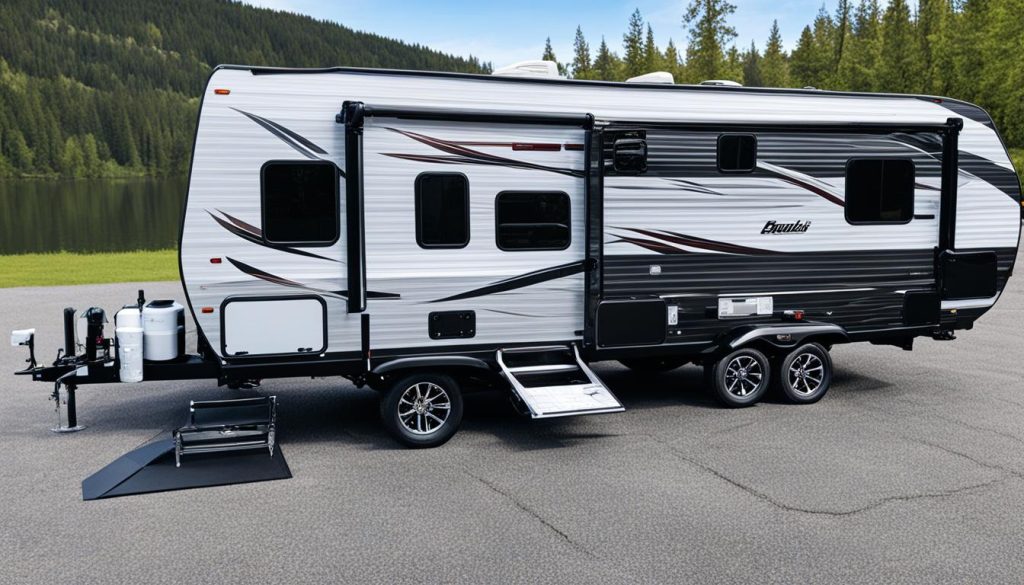
Travel Trailer Hitch Accessories for Enhanced Performance
When it comes to elevating the towing experience, travel trailer hitch accessories play a critical role. By investing in the right add-ons, trailer owners can expect significant improvements in trailer hitch performance, including better handling, stability, and safety. Innovative weight distribution systems and sway control options have transformed towing into a smooth and reliable process.
Extending Capabilities with Weight Distribution Systems
Utilizing a weight distribution system is a game-changer for travel trailer enthusiasts. By evenly spreading out the load that’s placed on the hitch, these systems prevent the rear of the tow vehicle from sagging, a common issue that can lead to reduced steering and braking responsiveness. With accessories such as the Eaz-Lift Elite or Equal-i-zer 4-point system, trailers move more in unison with the tow vehicle, ensuring a level ride and a more stable towing experience.
Sway Control Options for Improved Trailer Handling
Sway control options are essential for safe and smooth travel trailer towing, especially under challenging driving conditions. These accessories mitigate the side-to-side movement of a trailer that can result from sudden gusts of wind, passing vehicles, or uneven roads. Quality options like the Blue Ox SwayPro or Reese Steadi-Flex equip trailers to maintain directional stability and keep them aligned with the tow vehicle, offering peace of mind to the driver.
| Accessory | Function | Benefits |
|---|---|---|
| Eaz-Lift Elite | Weight Distribution | Prevents tow vehicle sagging, enhances control |
| Equal-i-zer 4-point | Weight Distribution & Sway Control | Combines leveling strength with sway reduction |
| Blue Ox SwayPro | Sway Control | Minimizes trailer sway, easy to connect/disconnect |
| Reese Steadi-Flex | Sway Control | Provides smoother ride, reduces noise |
Enhancing your travel trailer’s hitch capabilities with the correct accessories paves the way for seamless adventures on the open road. From the durability of a robust weight distribution system to the reliability of an effective sway control mechanism, these travel trailer hitch accessories are invaluable investments toward attaining optimal towing performance.
Installing Your Travel Trailer Hitch: Tips and Tricks
Embarking on a travel adventure with a travel trailer hitch requires careful installation to ensure your safety and the integrity of your trailer on the road. Having the correct information and the essential tools for hitch installation at your fingertips can transform this task from a daunting endeavor into a manageable and satisfying project.
Essential Tools for Trailer Hitch Installation
Before beginning the process of travel trailer hitch installation, it is pivotal to gather all the necessary tools. This preparation is key to a successful step-by-step hitch setup. The most commonly required tools include:
- Torque wrenches: For precision tightening of hitch components, ensuring stability during travel.
- Socket sets: These are crucial for attaching various bolts and nuts, a fundamental part of the assembly.
- Additional accessories such as washers or spacers may be required to ensure perfect fitting of the hitch and accessories.
By ensuring these tools are on hand, those installing a hitch can avoid potential hiccups that could impact trailer hitch safety down the line.
Step-by-Step Guide to Setting Up Your Hitch
A methodical approach is essential when it comes to fitting your trailer hitch. A typical hitch package comes with a detailed guide outlining each step, but here are the general steps you might expect:
- Assemble the hitch, if not pre-assembled, using the socket set to attach all the parts.
- Position the hitch to the tow vehicle and carefully align the holes with the receiver.
- Insert and secure the hitch pin, followed by tightening with the torque wrench.
- Attach and adjust any hitch accessories, such as sway control devices or weight distribution bars, using washers or spacers as necessary.
- Perform a thorough check to ensure all fittings are snug and secure.
While embarking on your travel trailer hitch installation, it is beneficial to watch instructional videos or consult with a professional to ensure a thorough understanding of the process. This hands-on knowledge complements the written instructions and aids in securing a hitch setup that is as safe as it is reliable.
Setting up your trailer hitch can be a straightforward task when you’re equipped with the proper tools and guidance. With careful adherence to safety guidelines and proper use of the essential tools for hitch installation, you’ll be on the road with confidence in no time. Remember, taking the time to properly perform a travel trailer hitch installation is an investment in your safety and the overall enjoyment of your travel experiences.
Travel Trailer Hitch Adjustment and Alignment Strategies
Meticulous travel trailer hitch adjustment and alignment are fundamental to ensure trailer hitch safety during your road trips. A well-aligned travel trailer hitch facilitates not only a smoother ride but also alleviates stress on the vehicle and trailer during towing. It is crucial to carry out periodic evaluations and make the necessary adjustments, particularly after changes in towing conditions or vehicle load.
To achieve optimal performance, there are key steps one should follow for trailer hitch installation and ongoing maintenance. Firstly, ensure that the hitch’s drop or rise is correctly set to match the heights of both the tow vehicle and the trailer. This alignment is crucial to maintain stability and efficient weight transfer. Additionally, the weight distribution must be periodically adjusted for balance, which prevents the tail from sagging and promotes even wear on all tires.
| Adjustment | Description | Benefits |
|---|---|---|
| Hitch Height Adjustment | Modifying the height of the hitch to level the towing setup. | Reduces stress on vehicle’s suspension, enhances stability. |
| Weight Distribution Tuning | Adjusting the tension on weight distribution bars. | Improves steering control and reduces trailer sway. |
| Hitch Ball Alignment | Ensuring hitch ball is slightly higher than the coupler. | Facilitates proper engagement and load balance. |
One key factor for alignment is making sure the travel trailer hitch ball is slightly above the coupler when not loaded. This compensates for the load once the trailer is connected. Moreover, the tow vehicle and trailer should be on level ground during alignment to ensure accuracy.
For those less experienced with travel trailer hitch alignment, it is recommended to consult the guidance of professionals as improper alignment can lead to hazardous towing conditions. Investing time in making precise adjustments is an investment in both your safety and the longevity of your equipment.
Affordable Travel Trailer Hitches: Budget-Friendly Options
Securing the right travel trailer hitch is essential for safety and stability on your journeys, but it doesn’t have to break the bank. For those keenly looking for affordability without sacrificing quality, there is an array of budget-friendly hitch options tailored to meet the needs of occasional travelers or those with lighter towing demands. Brands such as Fastway E2 and the Equal-i-zer have become go-to selections, widely recognized for their cost-effective travel trailer hitches that don’t compromise on reliability or the crucial features necessary for a secure trip.
Finding Reliable and Cost-Effective Hitches
When navigating the market for a hitch that is gentle on the wallet yet steadfast on the roads, one of the key factors to consider is the brand’s track record for producing reliable trailer hitches. It’s possible to find economically priced hitches that include advanced features such as sway control and weight distribution. These features are not just for high-end models; they provide peace of mind even in affordable trailer hitches, ensuring your travel trailer tows smoothly behind your vehicle.
Comparing Affordable Options for Occasional Travelers
For those who hit the open road less frequently, it is still pertinent to invest in a hitch that guarantees safety without necessitating a hefty investment. Comparing the specifications like weight ratings and the inclusive features of various budget-friendly hitch options available on the market, one can make an informed decision that balances both cost-efficiency and functional effectiveness. By doing so, you ensure that your chosen hitch provides a steadfast connection that upholds the joys and ease of your travel adventures.

